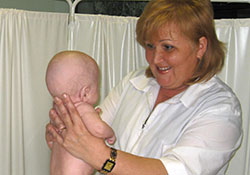Dr Natalyia Chuiko practices paediatric neurology in a children’s polyclinic in Moscow, Russian Federation

Dr Natalyia Chuiko
"After I graduated in medicine, I worked for three years as a general paediatrician at the primary care level. I was responsible for about 700 children, from birth to 15 years of age. I did the whole range of services for sick and healthy children: exams, prevention checks, vaccination; specialized services, references.
Later, I decided to do an in-depth study of neurology at the Kazan clinic, where I could both work with children in a clinical setting and do research as part of my postgraduate degree. For almost 20 years now, I have worked as a neurology paediatrician in an ambulatory institution called a children’s polyclinic. It provides services to about 14 000 children. We are more than 100 health professionals, with the whole spectrum of specialties beyond paediatrics. In Moscow, polyclinics for children and for adults are separate: this is found to be a good way of providing the best range of services and care. Until a few years ago, we provided care to children up to 15 years of age, now our mandate is for those aged 0–18 years. I think this change was for the better and in the interest of children, as it gives us a better opportunity to give them the best services until they reach adulthood.
After a baby is born, I make four obligatory examinations during its first year of life, every three months. Thus, I find problems at a very early stage and, together with the paediatricians, we are consequently able to follow the neuropsychological status of each child. When I judge it necessary, I refer children to specialized institutions for consultation or hospitalization, but families can approach that level directly as well. We also provide emergency services; we give references for sanatoria and other specialized types of treatment.
I like my work a lot, as what we do is on the border of various specialties – pedagogy, psychology, psychiatry – and there are many different aspects of how I work. Often the child cannot tell us about his or her problems, and sometimes the child does not recognize that he or she has a problem. That’s why I talk with parents, grandparents, friends – they may see the problem and their support is essential to help the child. Without such involvement, we in paediatric neurology cannot deliver good results.
I have not observed any significant differences between our practice here in Moscow and other parts of the Russian Federation, especially in terms of the medical equipment available and the competence of health personnel. In my country, paediatrics is one of the most prestigious medical specialties."


